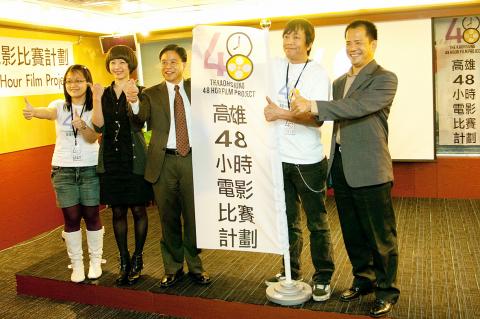Making movies can be a long, grueling process, often taking months and sometimes years. Not so for participants in the 48 Hour Film Project, which takes place in Kaohsiung over the weekend of May 27 to May 29. Aspiring filmmakers and actors will convene to write, shoot, edit and score short films as part of the project, which is held in cities around the world on different weekends throughout the year.
Originating in Washington, DC in 2001, the 48 Hour Film Project claims to be the largest timed filmmaking contest in the world. According to its Web site (www.48hourfilm.com), nearly 40,000 participants in 80 cities on five continents made 3,000 films last year.
The Taiwanese edition of the contest is organized by Don Quan (關奕威), a Canadian living in Kaohsiung. He says that since Kaohsiung is the country’s first city to host the competition, the biggest challenge he and his two assistants face is how to answer the myriad questions from participants. “You don’t know what to expect … It is new to everybody,” said Quan, a filmmaker who has made one short film and two documentaries about independent music in Kaohsiung. So far, more than 35 teams from Kaohsiung, Tainan, Taichung, Taoyuan, Hsinchu and Taipei have signed up to compete.

Photo Courtesy of Don Quan
Each team is required to arrange its own crew, equipment, budget and anything else needed for filming. Competitors will then gather at the Film Production Center, Kaohsiung City Government Bureau of Cultural Affairs (高雄市政府文化局拍片支援中心) at 6pm on May 27, when they will select genres in a random drawing. But that is not all: Each movie must contain a line of dialogue, a character and a prop that are assigned by the organizer in the US and will not be announced until the starting time at 7pm.
The filmmakers must work all the elements into their four-to-seven-minute movies. They have to turn in the finished works to the center by 7:30pm on May 29, and only films that are submitted on time will be included in the official competition.
The jury panel — composed of film director Chen Wei-ting (陳威廷), curator Huang Hao-chieh (黃皓傑) and director and scholar Ting Chi-fang (丁祈方) — will give out awards at a ceremony scheduled to be held by the end of next month. Those who do not make the 48 hour deadline but still manage to complete their works need not despair. All the finished films will be screened at Oscar Cinema (奧斯卡影城) in Kaohsiung City on June 1 and June 2.
The “Best of Kaohsiung” winning team will receive a trophy and a cash prize of NT$2,000, and will go on to represent the city in the final for the international title of Best Film of the 2011 48 Hour Film Project and screenings at Cannes Film Festival next year.
Quan said that there are still places for additional teams. The entry fee is NT$3,750 per team. To register or for more information, visit www.48hourfilm.com/kaohsiung.

The unexpected collapse of the recall campaigns is being viewed through many lenses, most of them skewed and self-absorbed. The international media unsurprisingly focuses on what they perceive as the message that Taiwanese voters were sending in the failure of the mass recall, especially to China, the US and to friendly Western nations. This made some sense prior to early last month. One of the main arguments used by recall campaigners for recalling Chinese Nationalist Party (KMT) lawmakers was that they were too pro-China, and by extension not to be trusted with defending the nation. Also by extension, that argument could be

Aug. 4 to Aug. 10 When Coca-Cola finally pushed its way into Taiwan’s market in 1968, it allegedly vowed to wipe out its major domestic rival Hey Song within five years. But Hey Song, which began as a manual operation in a family cow shed in 1925, had proven its resilience, surviving numerous setbacks — including the loss of autonomy and nearly all its assets due to the Japanese colonial government’s wartime economic policy. By the 1960s, Hey Song had risen to the top of Taiwan’s beverage industry. This success was driven not only by president Chang Wen-chi’s

Last week, on the heels of the recall election that turned out so badly for Taiwan, came the news that US President Donald Trump had blocked the transit of President William Lai (賴清德) through the US on his way to Latin America. A few days later the international media reported that in June a scheduled visit by Minister of National Defense Wellington Koo (顧立雄) for high level meetings was canceled by the US after China’s President Xi Jinping (習近平) asked Trump to curb US engagement with Taiwan during a June phone call. The cancellation of Lai’s transit was a gaudy

The centuries-old fiery Chinese spirit baijiu (白酒), long associated with business dinners, is being reshaped to appeal to younger generations as its makers adapt to changing times. Mostly distilled from sorghum, the clear but pungent liquor contains as much as 60 percent alcohol. It’s the usual choice for toasts of gan bei (乾杯), the Chinese expression for bottoms up, and raucous drinking games. “If you like to drink spirits and you’ve never had baijiu, it’s kind of like eating noodles but you’ve never had spaghetti,” said Jim Boyce, a Canadian writer and wine expert who founded World Baijiu Day a decade